Brett Kavanaugh - where the story goes from here
- Published
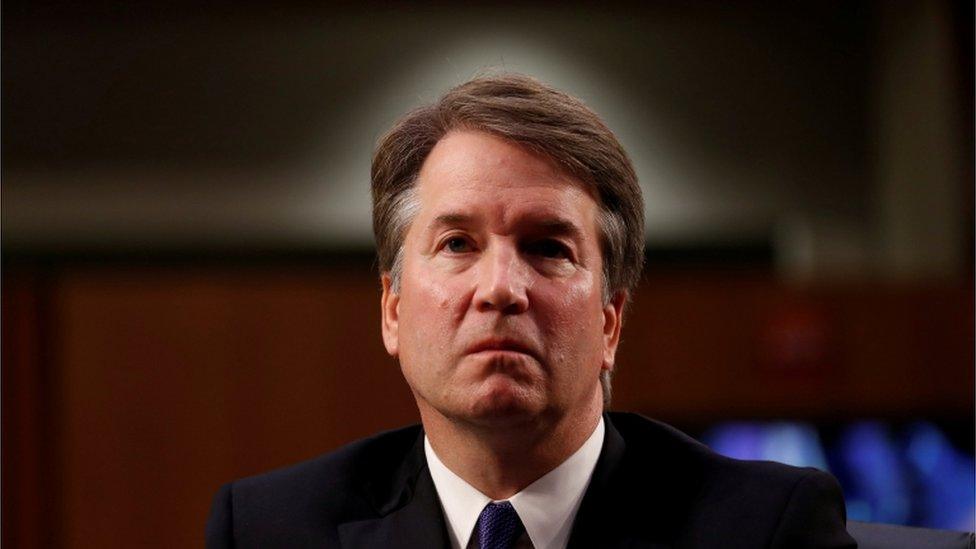
The first vote on Mr Kavanaugh's nomination had originally been scheduled for this Thursday
Just last week, it appeared everything was falling into place for Brett Kavanaugh and the White House.
A committee vote was scheduled for this Thursday, setting up confirmation by the full Senate later in September.
The 53-year-old judge would be safely ensconced in his life-time Supreme Court seat by the time the new term begins in October.
By Sunday night, that delicate, carefully orchestrated timeline was in shambles.
The allegations of sexual misconduct as a teenager that began swirling on Friday now have a name behind them, Professor Christine Blasey Ford, and disturbing details.
A drunken high-school party in the 1980s. An alleged bedroom assault. Decades of silence, followed by a documented conversation with a therapist in 2012. A secret letter now made public. A "categorical and unequivocal" denial from Mr Kavanaugh.
Washington can go from zero to full-blown scandal in the blink of an eye. But what happens next?
1. Testimony - of some kind
If Republicans, in a two-vote majority in the Senate, hold together, they could stick to their original schedule and hold their first vote on Mr Kavanaugh on Thursday.
By Sunday afternoon, however, there was unease in their ranks.
Retiring Senator Jeff Flake, who sits on the Senate committee that will vote on the judge, said he was "not comfortable" voting yes until the Judiciary Committee hears from Prof Ford.
Several other Republican senators - Bob Corker of Tennessee, Lisa Murkowski of Alaska and Susan Collins of Maine - have also expressed various levels of desire for investigation before a vote.
By Monday morning, senior White House adviser Kellyanne Conway was acknowledging this reality, telling Fox News that Ms Ford needs to be heard, and not ignored or insulted.
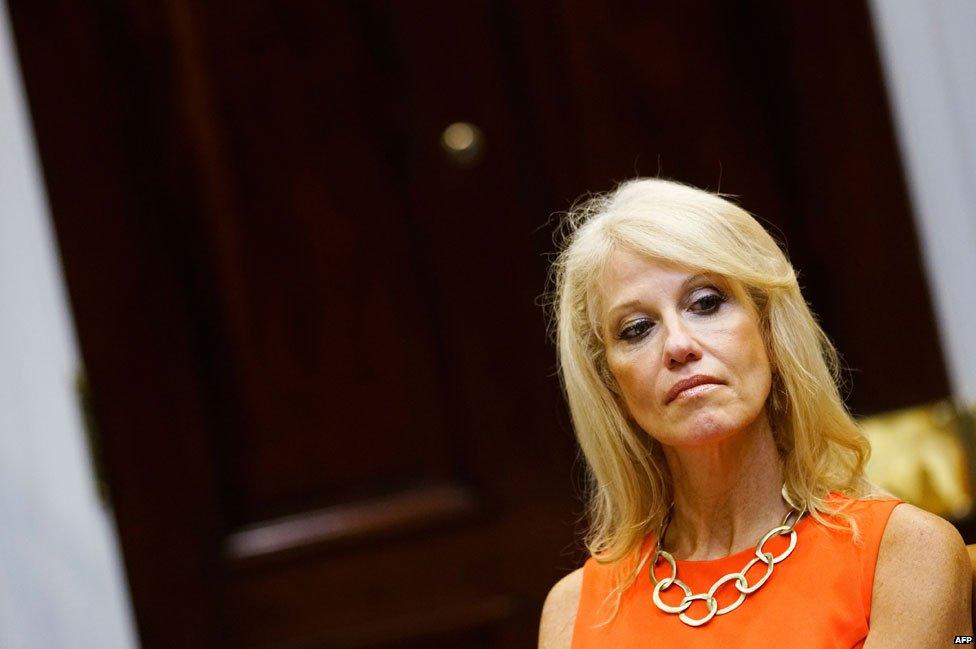
Kellyanne Conway called for Ford to be heard
That last bit could be seen as much as a message to the occupant of the Oval Office, who in the past has been quick to attack critics, and the president's eldest son, who on Sunday made an Instagram post , externalthat was dismissive of the seriousness of the allegations.
But if Prof Ford is heard by the committee, what form could it take? The highest stakes come from a televised hearing, where both the accuser and the nominee make statements and are questioned by senators on the committee.
That was how the committee in 1991 handled accusations of sexual harassment against Supreme Court nominee Clarence Thomas.
The hearings were tense political theatre, and while Mr Thomas was narrowly confirmed, the confrontation - which the nominee compared to a "high-tech lynching" - left raw nerves for years.
Republican leadership in the Senate might be more inclined to handle the situation with written testimony from both parties and a promise of further investigation by the FBI or Senate staff.
But would this be enough to satisfy Democratic critics? And, more importantly, would it satisfy the handful of Senate Republicans who are currently tapping the brakes on the confirmation process?
2. A vote delayed
How the testimony process plays out will go a long way toward determining exactly how disruptive it is to plans to get Mr Kavanaugh on the Supreme Court by the start of the term on 1 October.
Senators are itching to be done with their Washington business as soon as possible, given that 32 of them are standing for re-election on 6 November.
The chamber is scheduled to go out of session on 27 October, leaving just 19 days for official Senate business that month.
At the moment politicians on both sides of the aisle are calculating the political costs associated with this confirmation process. The closer any vote comes to the mid-term election date, the more politics will directly influence how the votes are cast.
Do Democrats in the Senate - 10 of whom are running in states Donald Trump comfortably carried in 2016 - want a court vacancy on their constituents' minds when they head to the polls?
In 2016 Mr Trump carried a record number of evangelical voters, in part because another court opening meant the ideological tilt of the Supreme Court - which decides issues like the constitutionality of abortion, gay marriage and capital punishment - was at play.
Supreme Court nominee Kavanaugh: 'I'm a team player'
For the moment, polls and momentum seem to be heading Democrats' way in the mid-terms. A confirmation crisis could shake things up - possibly to their detriment.
Republicans have their own concerns.
In 1991, the Thomas confirmation fight was widely viewed as leading to a surge in support for female - mostly Democratic - candidates the following year. California elected two female senators (including Diane Feinstein, who has taken a central role in the current controversy).
The year 1992 was labelled "the year of the woman", as Democrats won the presidency and solidified control of both chambers of Congress.
The Thomas hearings helped make the issue of workplace sexual harassment a topic of household conversation in the US.
The Kavanaugh situation comes in the shadow of the #MeToo movement, as women have become more vocal in expressing the everyday reality of sexual assault and discrimination and numerous seemingly untouchable men in positions of power have had precipitous falls from grace.
Republicans who hope this issue will break their way in the mid-terms, do so at considerable risk.
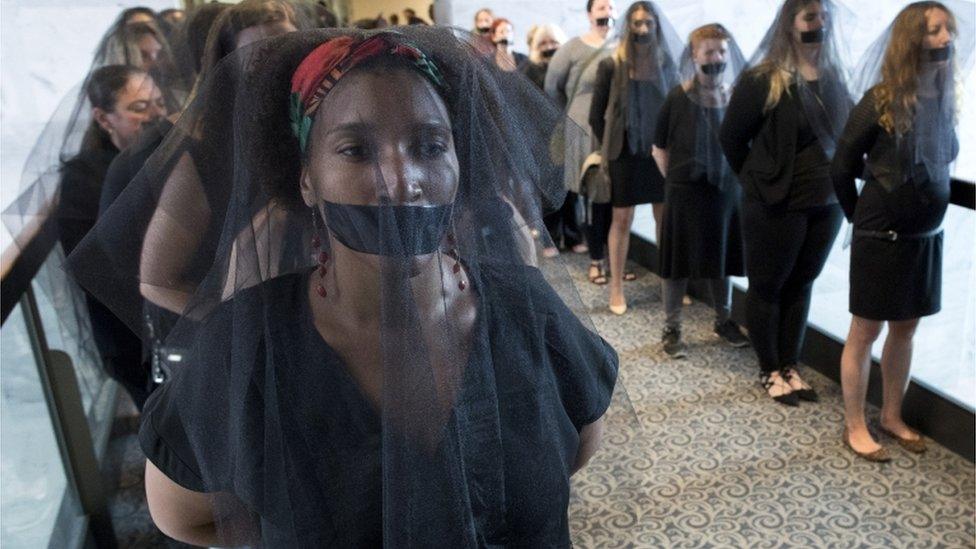
Women's reproductive rights activists protested outside the senate hearing room during Judge Kavanaugh's confirmation hearing
3. A vote denied
There is the possibility that the White House could pull the plug on Mr Kavanaugh's nomination if the political heat grows too intense.
While the president tends to stick by his personnel choices and dig in, it wouldn't be the first time he has backed down under duress. And if the votes in the Senate aren't there - if two Republicans flip to "no" and Democrats stick together - his hand will be forced.
This is where the scenarios become particularly fraught with political peril. If the White House has to start from scratch, there's virtually no way the new nominee could be confirmed before the mid-terms. Then everything hinges on the outcome of the elections.
If Republicans maintain control of the Senate - which seems probable but far from certain - they can begin a deliberative process to review and approve the new nominee.
If Democrats prevail, however, all bets are off.
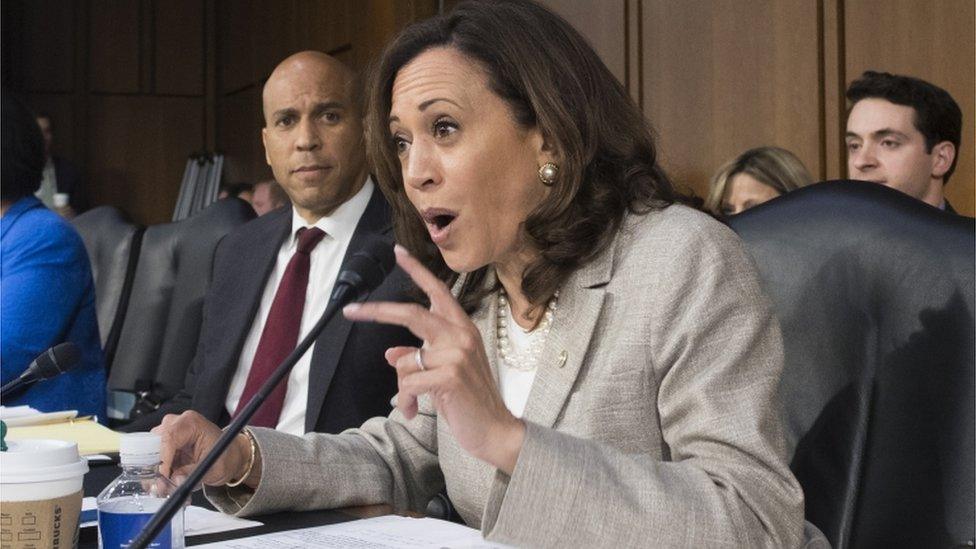
Senators Kamala Harris (right) and Cory Booker (left) question Mr Kavanaugh
Republicans could try to hold a vote in a December "lame duck" session, before new senators are seated in January. That would prompt howls of protest from Democrats who would claim that the will of the voters was being subverted.
The other option would be to hope that whomever Mr Trump nominates could garner some Democratic support in January. Given the depth of the partisan divide, that's hardly certain.
Back in 2016 Republicans held the court seat made vacant by Antonin Scalia's death open for a modern record of 422 days, until Mr Trump could take office and select a conservative successor.
If the cards fall a certain way in the coming days, weeks and months, the Supreme Court could be shorthanded for an extended period once again.
That was not part of the Republican plan when Anthony Kennedy announced his retirement back in June. But over the course of one weekend, everything has been cast into doubt.
- Published7 September 2018
- Published31 January 2017
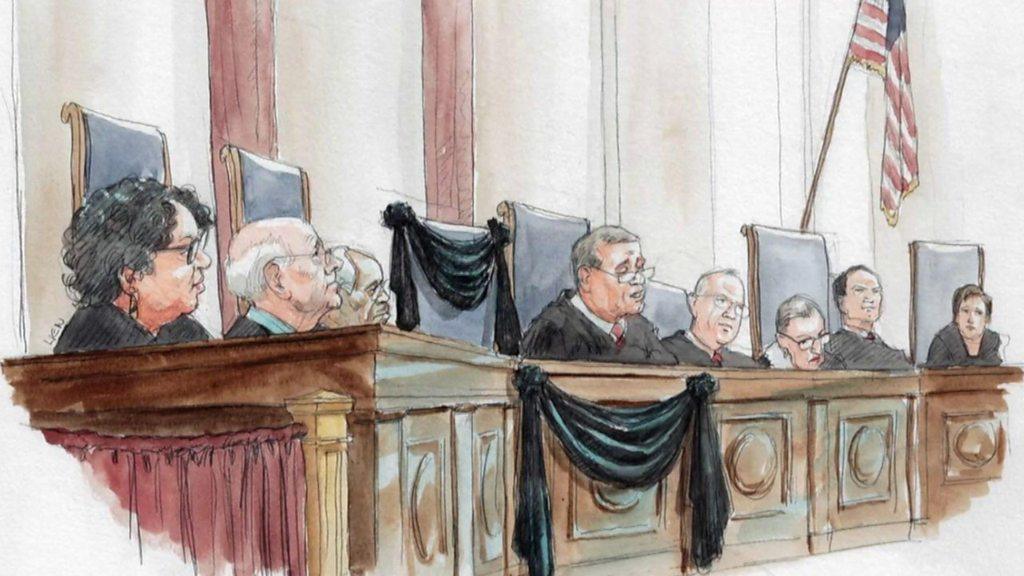
- Published10 July 2018